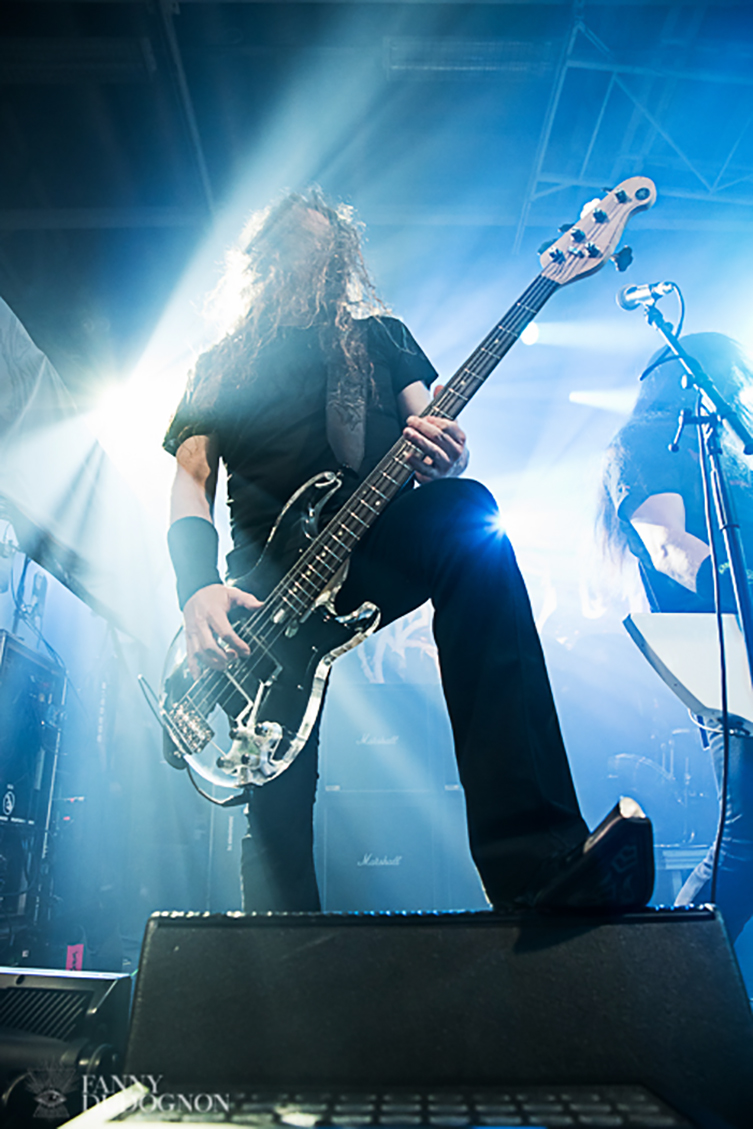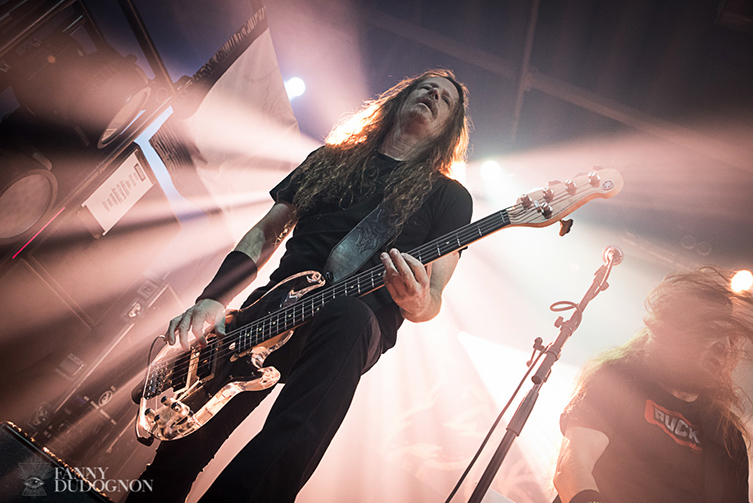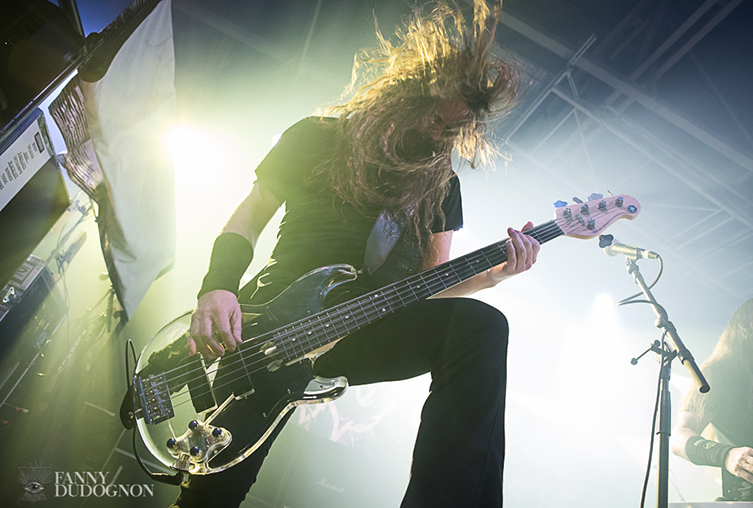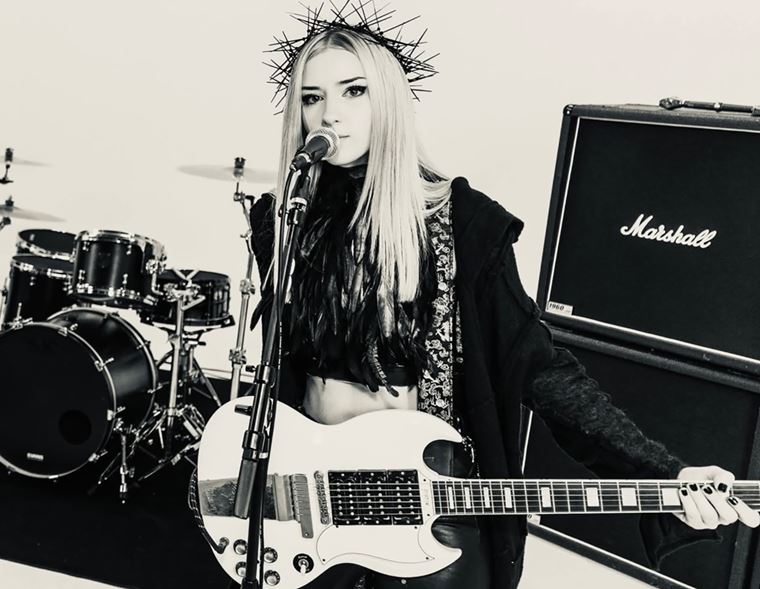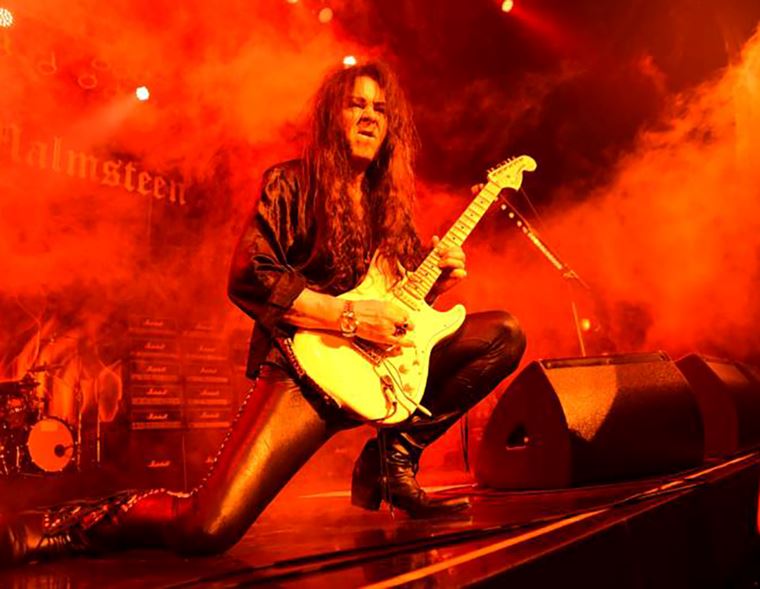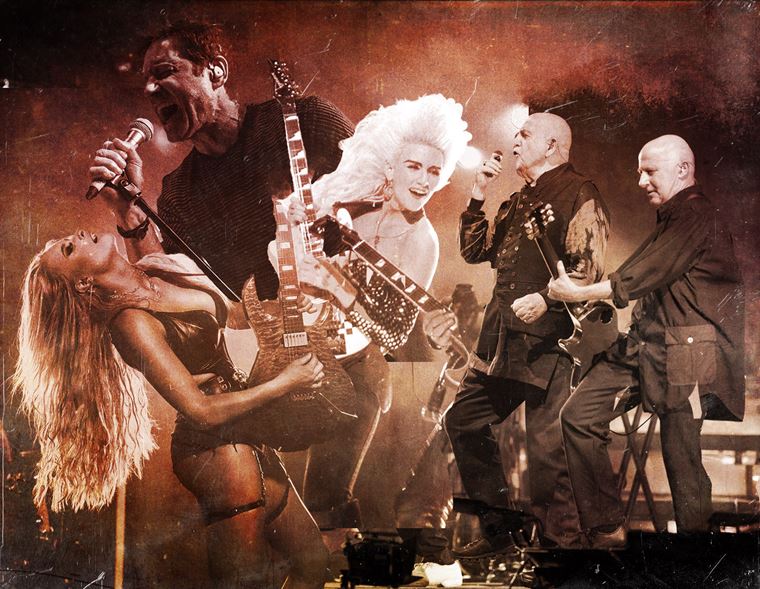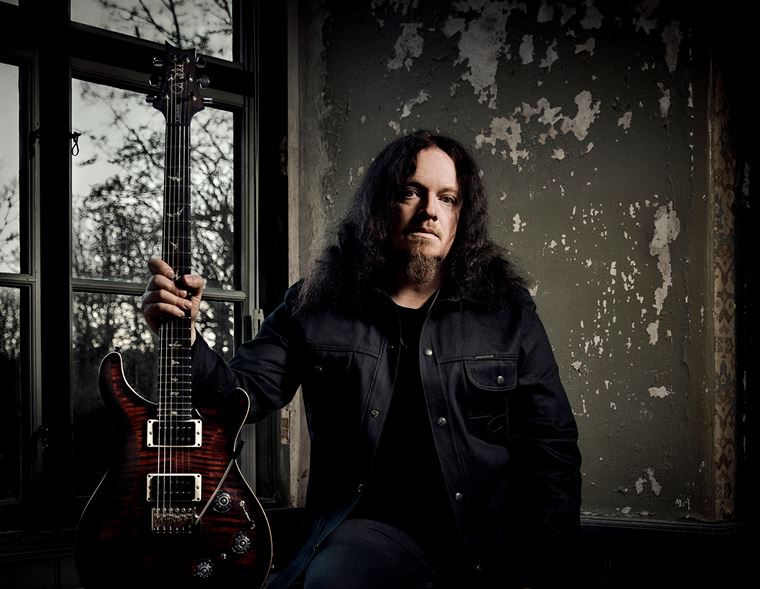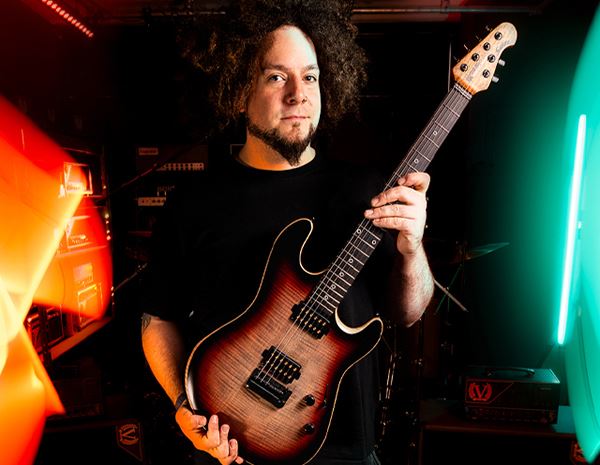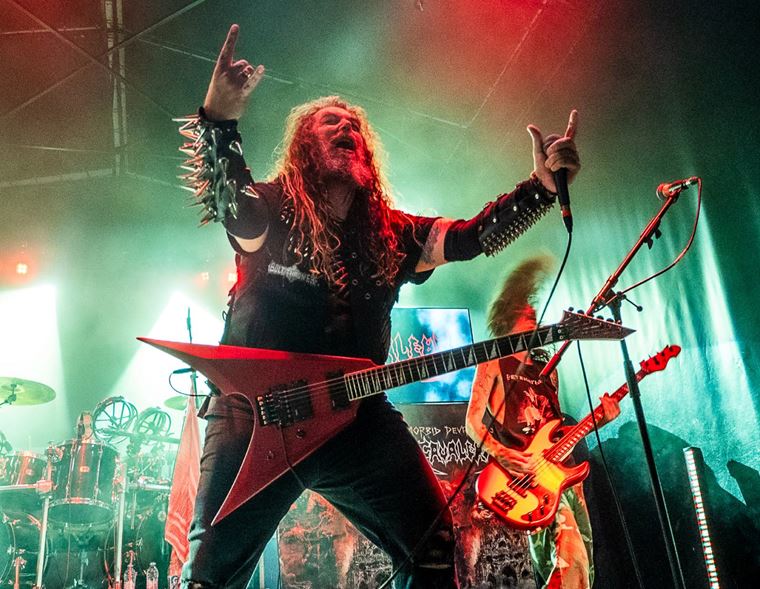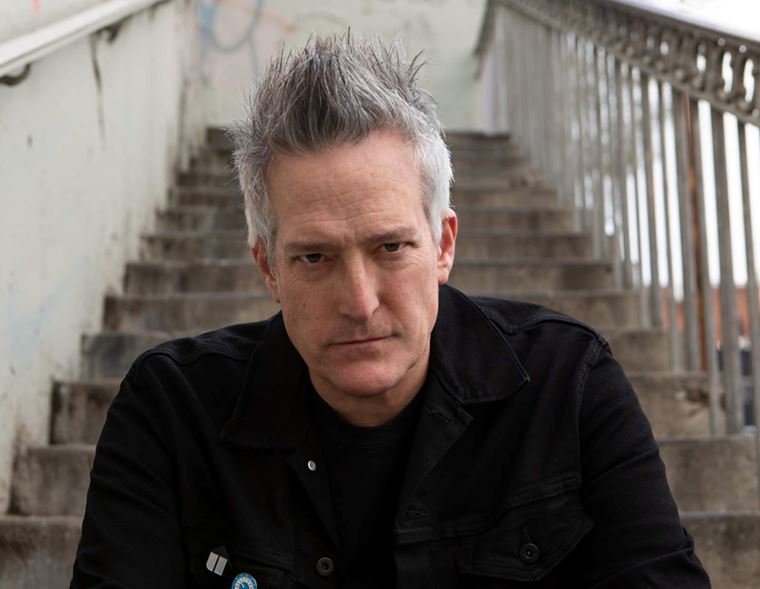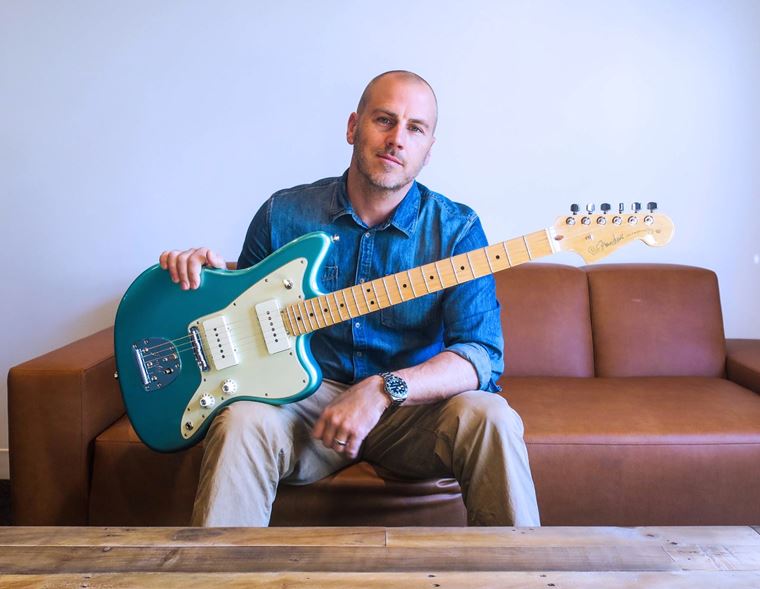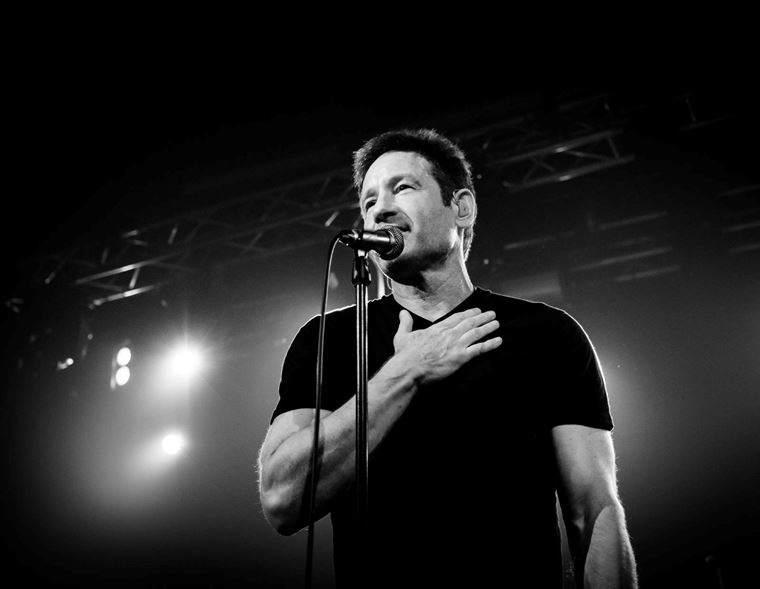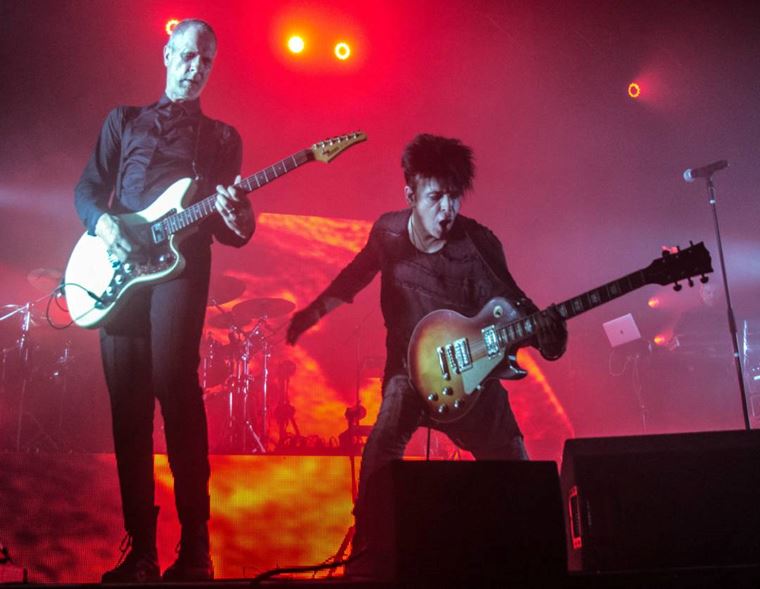The guitarguitar Interview: Jack Gibson of Exodus
Published on 10 April 2020
Exodus are pioneers.
As one of the original, and best loved, bands from the Bay Area, their sound is what now defines ‘Thrash Metal’ as much as Metallica or Megadeth. Since 1980, Exodus, led mainly by Gary Hoult, who also recently doubled up on guitar duties for the mighty Slayer, have left a trail of destruction in their wake, converting fans across the planet to their tight, barbaric style of Californian Metal.
The guitar sounds, the tempos, the vocals and the thundering low end changed the world in the 80s and people still reference that very sound today, in a wide variety of contexts.
A little over a month ago, Exodus came into town as part of a fantastic Thrash Metal package tour that included Testament and Death Angel. We managed to grab Exodus’ bassist, Jack Gibson, for a chat in the labyrinthine corridors and antechambers of the Barrowland Ballroom.
Jack was excellent company: very funny and laid back, with more than a touch of the Wild West in his demeanour and drawl. He shared lots of characteristically down-to-earth observations about bass playing, touring, live vs studio and a lot more. Jack had loads to say, and we were very interested to hear it...
guitarguitar: So, is this the first time all three bands have toured together?
Jack Gibson: All three together, yeah. I mean, we’ve all toured with each other in various different forms for years and years. But this is the first time all three of us have been on a package deal.
GG: And this is coming up to the end of the tour, isn’t it? There’s only a few more dates to go...
JG: Only a few more dates! We have tonight and three more shows.
GG: Nice, so how has it been?
JG: It’s been great, yeah! We’re all friends so it’s been...timewise it’s been long, but, I mean, everybody gets along so that’s great. It’s been kind of an eventful tour, we’ve been chasing the coronavirus around Europe and it seems like every city we play, that night, they shut the fuckin’ city down! (laughs)
GG: Wow, really?
JG: Yeah, they shut down Zurich the day after we left, we didn’t play Milan, they shut down Barcelona the day we left, they shut down Madrid the day we were there, same with Paris the day we were there...like, everyone’s just going crazy.
GG: Have their even any situations where you’ve showed up to a venue and they’ve said ‘no’?
JG: No, we’ve always been under their, you know, cap of closing things off. We were just on the cusp of every single thing except Italy. Italy just closed everything, so we missed that show.
GG: Was Italy quite recently?
JG: No, that was about mid-tour, so a couple weeks ago. It was the day they shut the cities down!
GG: Wow. Not exactly bass playing, but it’s historical stuff!
JG: Yeah, yeah!
GG: So, do you guys know if you’re gonna be able to go back to California okay?
JG: As far as I know! I dunno if they’re gonna be stickin’ fingers up where, but...
GG: Haha, I’m sure the person with the rubber gloves will be very gentle, haha! So, talking about California, the Bay area is the whole scene for the Thrash thing.
JG: Yeah.
GG: What was it about that area that gave those bands at that time that particular sound?
JG: I think that one of the things...I recently moved out to Nashville , and one of the things that I noticed was, like, getting into another musical setting, and watching kinda how everybody does things, it dawned on me that, like, nobody in that town know how to get this type of guitar tone.
GG: Ah, right!
JG: You know what I mean? And I think a lot of it had to do with everybody being friends in that scene back in the day. Everybody would get drunk, stoned, partying, and, you know, they’d talk all night about gear and who does what, and like, ‘I got this new thing’, and ‘this is how I do my stuff’. I kind of took it for granted. Like, everyone in the band knows how to get an amp and crank it into the high gain mode, so you can do the thing, the juh-juh-juh-juh (mimics heavy palm muting style), you know, get the sound. In Nashville, I’m actually recording these young guys out there called Denven and they’re killer, awesome players but they don’t know how to dial that sound into an amp. It’s cuz they haven’t had all those people to bounce off of, you know what I mean?
GG: Social sharing.
JG: Yeah, like I think in the Bay area, you know, Gary (Holt, Exodus/Slayer guitarist) would get the amp and figure it out, and it would go down the chain of ‘oh yeah, he does this and he does this’, you know? He has this amp, he has these pickups blah blah blah. It was just kind of like a big group share of ideas, it was like a smorgasbord and they could pick what they wanted.
GG: So, you go to each other’s show and be like ‘Yeah, that sound good’...
JG: Right, right! Exactly. I think that had a lot to do with it. I think that’s how scenes developed their sound. It was probably the same for Seattle: they probably sounded the same because they were all friends. They were playing with each other and talking it things, stuff like that. I think that has a lot to do with it.
GG: It must do!
JG: Yeah.
GG: With Seattle, you read so much into it, because a lot of it is industrialised and rainy, and it’s quite a morose, angsty sound...
JG: Right, right...
GG: So you go, OK, that makes sense! And then you look at the bay area and you know, it’s quite warm and nice! It’s California!
JG: Yeah, well, in Richmond, where these guys (Exodus) grew up, it aint that nice! (laughs) The weather’s nice, but there’s some rough-ass places in California too! California was, like, this weird double-sided thing where we have this ‘peace and love’, harmony and all that stuff, but also this extremely aggressive edge. I’m a huge fan of Country music, and now that I get out to Nashville, I listen to the guys who came from California, and they’re meaner. Like, if you listen to old Buck Owens kinda stuff, they were really leaning into the music: really, really aggressive picking for that time.
GG: The attitude is quite ‘metal’ even if the music isn’t.
JG: Yeah, exactly! And, like, Merle Haggard was out there. There was this mean streak hidden within some of the guys out there. They even talk about it in Nashville, like ‘yeah, the California guys!’
GG: Really?
JG: Yeah, ‘They’re aggressive! They got something to prove!’ But if you were already in Nashville and you were playing the, you know, easy listening-type of Countrypolitan stuff...out in California man, they were really pushing the limit on stuff. Guys like Glen Campbell and shit, really pushing it. California’s always had that kind of both-sides thing, the hippy flower side and this aggressive thing.
GG: That’s really interesting. Now, this is me reading into it as someone who isn’t Californian, but could that be a hangover from the days of the Frontier?
JG: Absolutely man, totally. I mean, it’s still there. It’s still the Old West out there man, in a lotta ways.
GG: It’s kinda like culture has built itself on top of it, but it’s not like it’s gone away, it’s there underneath.
JG: Yeah, yeah, it’s kinda both. Lie, it’s still an ‘individual’s’ place to be. I think that builds a lot into the scene.
GG: The attitude and everything.
JG: Yeah.
GG: That’s a much better answer than I was expecting so there we go! (laughs)
JG: Hahaha!
GG: So, since it was Yamaha who put us in touch, why don’t we talk a little about your gear and live rig. Am I right in saying you’re a fingerstyle player?
JG: Yes I am, yeah. Always been a finger player.
GG: Yeah, I’d like to get into that first then, actually! I lot of the riffs are quite complicated and quite fast: you’d need a lot of dexterity, right?
JG: Yeah, I mean, I’ve been playing ‘em for twenty-five years or whatever so they seem easy to me, but, y’know...When I was growing up, my favourite guys were Geddy Lee and Billy Sheehan and those guys were finger playing. Basically, I wanted to be Billy Sheehan but in Slayer.
GG: Yeah man, that’s a good combination.
JG: You know what I mean? Like, used his dexterity and speed but play this kind of heavy music. Luckily, I landed in this band! I went to BIT (Bass Institute, now known as the Musician’s Institute - Ray) when I was a young player and took some lessons from Billy. A lot of the heavy Jazz guys like Steve Bailey were there, another three-finger wizard, and there were just some really awesome Jazz guys who were finger players. Each one gave me a little piece of advice and info and I just kind of forged my own idea into this type of music.
GG: Yeah, interesting! In that case, before we get to the gear then, with the kind of Thrash Metal than Exodus play, do you see most of the job of the bass as strengthening the main idea of the riff, or do you find you get situations where you can go off and do something else?
JG: Well, I mean, a little bit of both but probably more of the first. It’s really about adding that low end to the riff.
GG: Power.
JG: Yeah. And when I first got in the band, I had the tendency to just try to match whatever Gary was doing. Usually that’s okay, every so often he’s like ‘no, I just want you to ride on the ‘E’’, or ‘I want you to do something a little simpler’. He’ll show me if he’s got an idea in his head and he’s always right. When it comes to, like, it’s his idea and he’s always got something I wasn’t thinking of. I kinda have a more straightforward, linear approach to thinking about things and he’s all fucking whacked out and he makes them riffs in the first place! (laughs) You know?
So him and our long-term producer (Andy) Sneep have kinda tamed me a little bit, especially in the recordings. I play less on the recording than I do live. Like, live, I’ll just Bah-la-la-la-lah (mimes some intense bass playing), but on the recording, I’ll pull some of those notes back and let it ring through the riff. Once it’s all mixed, you can’t really hear if I’m picking each note or if I’m picking 8th notes across it or whatever. So, whatever gives the best actual texture to the recording is cool.
Live is kinda of a different thing because each note has more of a percussive value, like coming at you outta the amps. I try to match the kick drum a whole lot more live and I’ll do the full triplets live and stuff like that. It looks better and it ends up sounding a little more aggressive live.
GG: I was gonna say, people want that: people listen with their eyes, right? They want that passion in there, and if you can do it, you should!
JG: Yeah, absolutely! So, there’s kind of a difference between the recording world and the raging live world.
GG: Yeah, indeed. So, how does that work out with your equipment? Do you tend to have a different type of rig live than you would in the studio?
JG: Uh, I use the same bass all the time. In the studio, I literally just go direct. Like, I don’t even use my amp in the studio. I think, during the first few albums, Andy was re-amping it through an old SVT and I think the last couple, he’s just used...well, I know for sure on the last one, he’s just used Kemper plugins, and he just stacks ‘em up and gets them just right.
GG: Well, if it’s good enough for him...
JG: Yeah, I mean, for one thing, the Kemper settings that the guys use, uh are exactly the tone on the album. They figured out how.
GG: Good, so the guitarists use Kempers too?
JG: Yeah, they use Kempers live. I still like a bass head a little bit better. I’ve heard the Kempers and they’re fine: it sounds good. But I’m a pretty simplistic type of guy. I want a bass, a head and a cab. Run it through the wireless and send it via direct box out to the front, but I still like my head. And it’s still a little less complicated than a Kemper!
GG: It is!
JG: You know what I mean? I don’t change tones, I just get one sweet sound and then I just kinda roll with that. I thought about it, because we have a backup Kemper on our side (of the stage) for Lee (Altus, Exodus guitarist – Ray) and I’ve been meaning to have Andy make me the bass profile and just leaving in Lee’s backup, so that if everything went wrong, I can just turn Lee’s on and I can still have tone.
GG: Totally!
JG: But I have a direct box that has some tone in it anyway so I’m not in a hurry to do so.
GG: Eventually.
JG: Yeah. The more complicated it gets, the more problems you can have.
GG: Yeah, absolutely. It’s great having the ability to do that though, right?
JG: Oh yeah!
GG: So, your Yamaha bass, what is it you look for in a bass? Do you prefer actives? Passives?
JG: Everything I use now is an active. Several years ago, I got a couple of passive basses from Yamaha because I was tired of, like changing the battery, like most guys! (laughs) I was tired of having tone problems and fucking with my amp for half an hour, and then going oh, maybe I should change the battery...(laughs)
GG: We’ve all done it!
JG: Right, exactly! So, I ended up getting passives, because I thought it would just work better on the road, and instantly realised what I was missing with active pickups. Passives are great, they kinda have more of a wood sound, like a more natural sound, but with this type of music being as percussive as it is, it also projects every mistake.
GG: Oh!
JG: So, if I half-hit a note, or missed a note, it was fuuuckin’ silence, you know what I mean? And, like, with the actives, if you hit half a note or whatever, you still get an ‘Oof’ outta the amp. You still get a punch through the amp, so it doesn’t sound like everything fell out from under you. So, in a funny way, the actives kinda cover...it keeps it a consistent noise.
GG: Almost like compression?
JG: Yeah, almost like compression! So, in the end, I put those basses back. I was like: (mimes sneaking) ‘Sorry, I won’t do that again...’ (laughs) So, the bass that I settled on using...I bought an old Yamaha BB G5S. It’s kind of a cut-down version of the Nathan East signature ones?
GG: Sure.
JG: And, whatever the preamp was in this, the active preamp, whatever the preamp is in the cheap one, is the fucking best thing (slaps hands for emphasis)! I have the Nathan East ones, and they have a high-mid-low sweep, and then the one I use is just a high-low. I don’t know why, but for some reason, that one is another 30% louder than the cut up model. The cut above ones are nicer basses cuz they have figured tops, better fretwork and the neck has a tilted headstock. It’s a better piece of work, but that preamp! It just rages, man! At this point, Yamaha doesn’t make it: they actually don’t know even who made it or designed it! They can’t make ‘em again.
GG: Oh, right, right...
JG: So I just keep buyin’ ‘em! I bought a whole bunch of ‘em cuz they come up on eBay. I’d take ‘em in (to Yamaha) and they’d paint them the colour I want ‘em, make sure all the hardware is greased and good, so I have kind of a flotilla of these basses. I have two over here that I leave in Europe and I have, y’know, a few in America that I fly out with and stuff.
GG: Cool, so you’ve always got that particular preamp with you.
JG: Yeah, yeah. Actually, I just took a chance, there was a service manual for that bass on eBay and it came up on my watch. I bought it for like 20 bucks and it’s got the schematic in it for the preamp!
GG: Oh, cool!
JG: So, I’ve been talking to a couple of different pickup companies about like getting in with them and designing an actual ‘pickup’ pickup that just does what that preamp does, and gives me the exact same output and everything.
GG: Sounds good, and it could be made available to other people too, right?
JG: Yes, exactly. It would be ‘the’ thrash pickup to get if I can make it happen.
GG: Cool, so maybe something to look out for in the future, yeah?
JG: Yeah, I’m talking to a couple of different companies about it and I’m also talking to a couple of, like, dudes, who are like ‘yeah, I think I could cut that chip and make it’, you know what I mean?
GG: Yeah, definitely.
JG: So, we’ll just need to see. These ones that I’m using, they are slowly deteriorating as I keep beating them up. I know eventually there just gonna start dropping off and I’m gonna have to have something to take its place, especially live.
GG: Yeah, of course, when they are so important to your sound. Cool! So, you’ve been with Exodus for over twenty years now...
JG: Mm-hmm.
GG: How does it feel as a player to go out every night and be part of a band that everyone knows is a pioneer of a genre?
JG: Oh, it’s great man. I mean, it’s lucky, I just feel lucky every day man. I fell in with the right guys. We all get along well, which not very many bands, you know, actually get along, especially after decades of being together. We fight, but we’re like brothers. We all have pretty much the same idea of where this should go. All that crap that needs sorting out got sorting out years ago. We’ve learned how to tolerate it, you know what I mean?
GG: Haha, yeah.
JG: And, I mean, I just get to play these classic tunes every night. Seeing the faces of all the people, they love it. I just love it. I’m lucky. Lucky to be able to do it in the first place and to hang on for 22 years! It’s very cool.
GG: Yeah! Good man, good. But it’s also hard work.
JG: It is hard work, but it’s still...I mean, everybody works. The guys on the building site I know work hard. The dudes in Nashville I know, they work twice as hard as me. Three times as hard as me! (laughs) And they don’t have the benefits of the things that I have, you know what I mean? Like, I got lucky AND held on and done the right thing, you know?
GG: That was one of the things I was going to ask, actually. As a musician, what’s the key to longevity in the industry? Luck plays a part: I think it’s impossible to say it doesn’t, because otherwise everyone who is good would be at the top, and that’s not the case.
JG: That’s very true.
GG: So, apart from luck, what’s the secret to lasting for decades?
JG: I mean you gotta be to, like, you HAVE to be able to maintain your individuality but let your ego rest, man. You have to work with the other people, and you have to compromise. You have to compromise with the producers, you have to compromise with the guys in your band. If they tell you you’re too loud, you gotta fuckin’ turn down (laughs), even if you know you’re not too loud! Which I never am! Haha!
GG: Haha, of course!
JG: You know, you gotta cooperate! You gotta really want it. You gotta want to be here more than you want your pride to be attacked or whatever.
GG: That’s a good one.
JG: No matter what, at some point in time, you’re gonna feel like ‘fuck this!’ and ‘fuck these guys!’ You know what I mean? You just have to keep doing it, man.
GG: Catch yourself in the moment and go ‘If I storm out, it’ll be worse than if I just take it’.
JG: Yeah. And you also have to kind of set your expectations lower than what your dreams are, because they’re always that. If you got into your favourite band (as a member), there’d be shit you hate! You know what I mean? (laughs)
GG: Yeah!
JG: It’s not what you think it’s gonna be, so you have to be ready for what it really is. This is just the only thing I ever really looked forward to doing, workwise. Just working in music. I do recordings and, you know, production stuff too, and if it’s not something...like, when I’m doing a recording, if it’s a band that I don’t like? Ah man, torture. So, I really only take on bands that I’m interested in, or I like the people in the band and I’m OK spending a month with them! It’s the same with the band: you gotta be in that little tour bus for a month, you know? You gotta smell their feet, you gotta smell their farts, you just have to resign yourself to do it.
GG: You have to think of the guy who wants your job, who is doing a 50 hour week in the office.
JG: That’s right, that’s right. And whenever I’m mad, I picture myself flippin’ burgers. And then I’m like ‘Ok, it’s cool’. Haha! Cuz inevitably, the guy who’s working with me flipping burgers would be an asshole too, and I wouldn’t like him either, so, you know! Haha!
GG: Yeah, good point! Nothing gets solved, haha!
JG: And this is also a thing that I was just talking about with somebody. I ‘ve watched, maybe for 22 years now, I’ve watched a lot of bands come and go, I’ve watched a lot of bands who’ve opened for us become Slipknots, things like that, the biggest bands out there at one point. You gotta be nice to those people because they’re always going to have something to offer you.
GG: Yeah that’s a good point! Be good to everyone. So, to wrap things up with one final question: after this tour is done, you mentioned you have a couple of other production things you’re interested in doing, so what does the rest of the year hold for you and for Exodus?
JG: Well, I think Tom and Gary are gonna start writing in earnest when we get back. They’ll probably take a little bit of a break and then they’re gonna...they have to get in a room together and hammer the songs out. I used to try to be there every day with them and then I kind realised that I was more in the way than contributing. I was stopping Gary to have him show me something or whatever. But when they are together, they just hammer it out. Not only that, if I learned something, Gary’d change and I’d have to relearn it, he’d change it, I’d relearn it...so now I kind of just let them do their thing. When a song is done, then I learn it. So I don’t need to be there for most of that writing service, and once we start working on stuff in earnest, I’ll get down there. But, on the last album, on Blood in Blood Out, I recorded all the guitars and vocals and bass, and I didn’t even have time to learn it! Like, it was time for me to do bass and I’m like ‘I need a couple weeks, guys! I’m sorry! I don’t know these songs yet, I’ve been working on all this shit!’ I had to stop and go home, do my learning!
GG: Haha, that’s insane!
JG: Yeah! I had to get the bass back in my hands and start playing. And then I had to learn how to record myself without, like, losing my mind.
GG: Haha, yeah.
JG: You got the song here, and the computer here, I was kinda confusing myself! I was like, ‘I have to get a work deep-flow to do this’. But this time, I’m not gonna be doing the tracking, so I can just focus on playing and getting it. Also, the other thing too is, I only ever learn a basic skeleton of the song, because once I get there, it’s like ‘we’re gonna change it’ it, right there on the spot. So at first that would frustrate me. I worked this thing out, and it would be like ‘well, try this...’ and I’d be like (mock outrage) ‘Whaddaya mean try this?’ (laughs) So now I’ve just kinda of taught myself to be more open and just be ready to go in and try this. And if that one sticks, cool, let’s do that, you know what I mean? Take Pro Tools and stick it there, so I’m a little less stressed about any of that. I’m ready to do it, I go in, I listen to the songs and I know how the changes go. I’ve kinda got them under my hand but Gary’s gonna want me to try something else here and there. I’m a little less structured about it these days.
GG: Be familiar with it, but have that percentage available to be open to changes.
JG: Yeah, just be ready to do whatever. Don’t be like ‘I have to do this’, just be ready, be calm. You know, people get into the studio and they get really nervous and it’s not, you don’t have to do this, especially now: we’re not even paying for tape any more! It doesn’t matter, you can do the worst fuckin’ thing even and you can just do it again and it’ll be fine. Just knowing how Pro Tools works and stuff, it makes things a lot easier in so many ways.
With that, we came to the end of a really enjoyable conversation. Jack and I wandered through the catacombs of the Barrowlands for a bit and then we said our goodbyes. It’s great to get some down-to-earth advice and perspective on the touring life, especially form a veteran who has definitely earned his stripes.
Not long after we spoke, the country of course went into lockdown and, as yet, is still in such a state. I’m sure Jack and the guys are home safe and sound. We’re looking forward to the next Exodus album and tour for sure!
We’d like to thank Jack for finding time in his schedule to talk with us so candidly. We’d also like to thank Yamaha for helping set this up.
Keep up with Exodus via their official Exodus Attack website and please click through to see our selection of Yamaha basses.
Thanks for reading.

